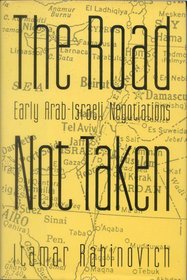Search -
The Road Not Taken: Early Arab - Israeli Negotiations
The Road Not Taken Early Arab - Israeli Negotiations
Author:
For five decades, the Arab world has technically been in a state of war with Israel--a pattern broken only by Cairo's Camp David accord with Jerusalem. No conflict in international politics has seemed more intractable. But for a few brief years after Israel's War of Independence, the Jewish and Arab states engaged in direct negotiations ... more »
Author:
For five decades, the Arab world has technically been in a state of war with Israel--a pattern broken only by Cairo's Camp David accord with Jerusalem. No conflict in international politics has seemed more intractable. But for a few brief years after Israel's War of Independence, the Jewish and Arab states engaged in direct negotiations ... more »
ISBN-13: 9780195060669
ISBN-10: 0195060660
Publication Date: 10/10/1991
Pages: 272
Rating: ?
ISBN-10: 0195060660
Publication Date: 10/10/1991
Pages: 272
Rating: ?
0 stars, based on 0 rating
Genres:
- History >> Middle East >> Egypt
- History >> Middle East >> Israel & Palestine
- Nonfiction >> Current Events >> War & Peace
- Uncategorized >> International & World Politics >> European
- Uncategorized >> International & World Politics >> Middle Eastern





